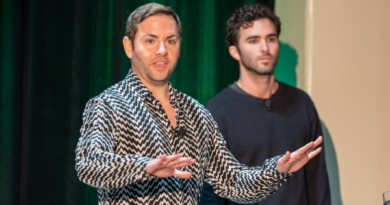The VC queen of portfolio PR, Masha Bucher, has raised her largest fund yet: $150M
Masha Bucher knows what she likes and goes for it. After all, venture capitalism is about taking bold risks — and at the earliest stages.
That strategy has paid off for the founder and general partner of Day One Ventures over the past six years. The early-stage venture capital firm took a unique take on the industry by spearheading public relations for its portfolio companies.
Through Fund I ($20 million) and Fund II ($50 million), the Silicon Valley firm’s portfolio has had 22 exits, including an IPO with Terran Orbital. It also has backed eight unicorns, including Superhuman, Remote, Worldcoin, Truebill (which exited to Rocket Companies in 2021) and DuckDuckGo.

Five years ago, Day One Ventures had $11 million under management, and Bucher and her team grew that to just over $450 million, she told TechCrunch. She’s also surrounded herself with subject-matter experts, including ClassPass co-founder Sanjiv Sanghavi, who joined the firm in 2022 to invest in climate tech.
On Tuesday, the firm announced its Fund III of $150 million to back early-stage founders “solving humanity’s most pressing issues, from profound wealth disparities to the urgent threat of climate change and the growing sense of social isolation.”
She also said the new fund “marks a new chapter, encompassing a deeper integration of art and culture alongside our established expertise in storytelling and PR.”
From Russia with PR prowess
Venture capital is not the only area where Bucher took risks. She grew up in Russia. Going by Masha Drokova. The Washington Post did a rather lengthy piece in 2022 about Bucher’s teenage ties to Russia, which included being a teen leader of Russian President Vladmir Putin’s youth organization, Nashi. There is also a 2012 documentary made about that called “Putin’s Kiss.”
Speaking about that, Bucher said she was young, and it wasn’t something she felt she was able to choose for herself, whether or not to be a part of the organization. She also called the WaPo article “inaccurate” — it had reported Bucher meeting wealthy Russians and accepting capital from them. She told TechCrunch she was never associated with them nor took money from them.
“I cannot go back to Russia because I’m an enemy of the country,” Bucher said. “I can’t see my grandparents. That’s not home for me at all. I also deeply disagree with what they do, as well as deeply sad for the damage they’ve done to my relatives in Ukraine from my mother’s side.”
Meanwhile, she started her first company at 18 years old, a social media agency, that grew to 80 people in six months. She then made the progression to public relations as an area that provided an outlet for her to learn more about how businesses operate.
In 2010, she met Runa Capital co-founder Serg Bell on Twitter. “When we connected, he was already the founder of three unicorns, which was quite surprising,” Bucher told TechCrunch. “He told me about startups and about his quantum technology projects in Singapore and in London. As he was outlining to me what he’s working on, I realized that it’s much more catering to the world than doing social media marketing.”
Bucher liked what she heard and joined Bell at Runa Capital in 2011. She served as PR director for the company until 2013, when she joined data protection startup Acronis as vice president of communications.
Bucher came to the U.S. around 2014 and opened M&A PR Studio. She worked with clients, including Houzz, Hoteltonight and PandaDoc. She was meeting a lot of founders and working with about 100 companies. And they were asking her for guidance on more and more issues outside of public relations.
“It was clear that I was helpful in more ways than PR, and they would tell me that it was helpful to have someone to talk to about strategy or business development,” Bucher said. “I didn’t want to limit myself just because we had a contract, because it was interesting for me.
In 2017, she decided to flip the script a bit and become an angel investor where she could take risk and do PR for free. She invested in companies, including Lithic, Chatfuel, Acquired.io and Truebill.
A year later, Bucher exited M&A PR Studio and started Day One Ventures.
Making bets on AI
Over the past six years, the firm has focused on areas like AI, fintech, climate, future of work and web3 — some of which are areas that have fallen out of VC favor in favor of all-things AI.
She told my colleague Anna Heim in 2023 that, on average, two AI startups out of 1,000 startups will survive if they don’t have both the knowledge and business acumen to tackle this industry.
If executed well, though, Bucher believes AI will help us function more efficiently as a society.
“There are huge economic inequalities, like climate change and health care problems, and I think AI will help solve it,” Bucher said. “AI will come and unlock an abundance of resources that bring us humanity. Over time, it will help people be happier. When we invested in Superhuman, my mind was blown at how they can write emails for me in my style and edit with a short command, like ‘hey, it’s too long.’”
It’s a new dawn, it’s a new Day One
Now with Fund III, Day One Ventures is adding a focus on what Bucher called “Future of Human,” which Bucher said is a category that sits at the “crossroads in history, technological advancements unlock unprecedented possibilities for human progress.”
Future of Human will also have the firm considering a deeper integration of art and culture, she said.
A few of Day One’s recent investments include Rainmaker, a cloud seeding startup that will force clouds to form over and rain on drought-stricken areas; Astroforce, which is mining asteroids in space; Affiniti, offering industry-specific credit cards to small businesses; and blockchain network Layer N.
In addition, the firm invested in Cradle Healthcare, which is developing technology to cryogenically freeze bodies. Yes, the latter technology is already available, however, what Cradle is working on is faster freeze technology and also a way to reverse it, Bucher said.
“Cradle’s goal is to preserve your personality and memory for the future,” she said. “Freezing your brain in the past was so slow that part of your brain turns into water, so it’s all damaged. Cradle can freeze it so fast that it doesn’t turn into water, so you can preserve it.”




